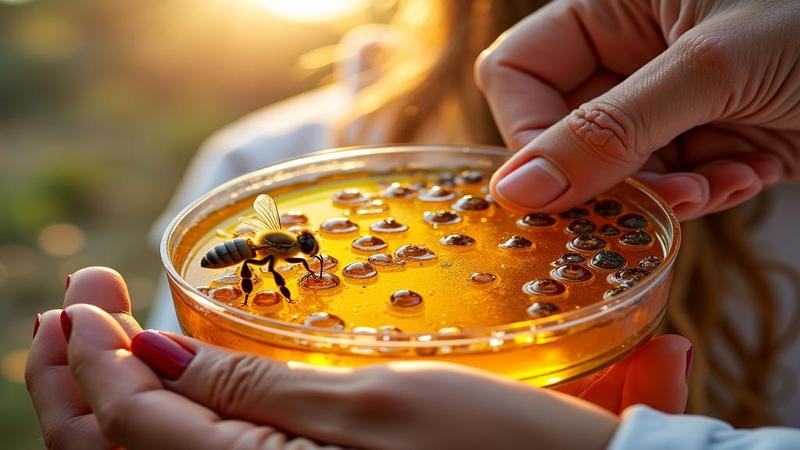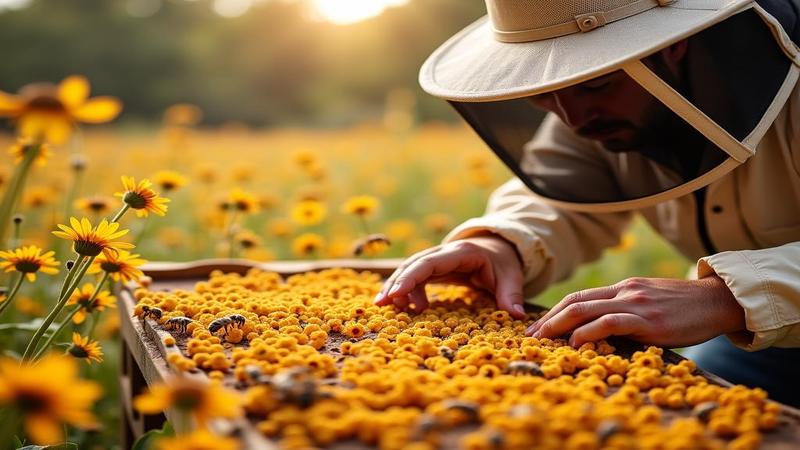Engineered Yeast Delivers Essential Bee Pollen Sterols, Scientists Finally Nail Beekeeping

Scientists announced a breakthrough that sounds like a nutrition supplement commercial and ends with a bee in a lab coat. In a development many pollinators described as ‘pretty neat,’ engineered yeast now provides pollen sterols that bees can’t live without.
According to the paper, the yeast is engineered to produce these rare sterols during fermentation, turning lab broth into a potential pollen substitute.
Beekeepers reacted with a mix of relief and confusion, noting that the hive’s mood now depends on whether the culture is bubbling. They said the smell of science in the apiary is oddly comforting.
The researchers insist the sterols help bees build robust cell membranes and navigate flower fields without getting cranky about pollen’s taste. They added that the discovery could reduce yawns in the field and increase waggle-dance productivity.
Critics noted that this is the sort of triumph that makes grant reviewers smile while pretending to be surprised. The team insists the food chain can handle it, one culture at a time.
To test viability, scientists fed hives with the engineered yeast and monitored brood development, honey production, and the occasional philosophical hive-level question about what counts as ‘natural.’ They reported promising results, though the bees remained mysterious as ever.
Field trials took place in a climate that sometimes smells like burnt toast, which scientists say is perfect for dramatic headlines and buzzing photo ops. Bee colonies behaved better than expected, perhaps because they were too busy pretending to understand fermentation jargon.
All parties insist the approach is safe, noting that the word ‘natural’ sometimes covers more marketing than biology. Regulators are reportedly snoozing through the safety dossier but nodding along to the power of bee memes.
The team jokes the breakthrough could slash the cost of supplements, opening shelves for ‘bee-friendly pollen bars’ at neighborhood co-ops. Meanwhile, policy makers flex their pencils and pretend this is a turning point for agrotech nutrition.
Industry observers say the line between biotechnology and brunch tweets is getting thinner, and hive managers are taking notes on social media marketing as much as bee health.
A press briefing turned into a pastry break as reporters demanded an edible demonstration. The lead scientist offered a sugar-coated version of the phyto-sterol pathway and a wink.

Bees themselves can’t read abstracts, so the researchers trained the hives with the same science people use to bake sourdough. The result is a project that tastes a little like science and a lot like patience.
One senior scientist admitted the real challenge was wording the paper so it sounded exciting enough to justify another grant cycle. He claimed the bees are confident in the design, even if the reviewers are not.
Meanwhile, regulatory officials asked for more safety data, while volunteers wore bee-themed clipboards and tried not to hallucinate from the pollen. The public relations team steered the narrative toward ecological harmony and harmless yeast microbes.
In a side note, marketing departments reportedly brainstormed consumer-friendly labels for the product, including ‘organic hive vitamin chews’. The team quickly vetoed the phrase as ‘too delightful to be scientific’ and moved on to more sterile branding.
Backers say the technology could help in urban beekeeping where flowers are scarce and social media is plentiful. They promise dashboards that show bee moods almost as reliably as sunrise.
Critics warn about overreliance on a single nutrient and remind readers that bees evolved to eat wild pollen, not lab-grown snack packs. Still, the idea has spawned a chorus of Buzzfeed-like headlines and earnest think pieces.
The report suggests sterols may influence queen development, which means queens could start demanding worker salaries and extra royal jelly benefits.
Some scientists call for independent replication, while others insist this is a great example of bench-to-beehive translation. The public relations team insists the public will love this story more than a drone show.
The broader apiary community is watching as pollen politics shift toward ‘phytochemical entrepreneurship’ and bee memes. If nothing else, it has made beekeeping look a lot like a startup accelerator.
Several beekeepers report their hives politely asking for more data and less buzzwords during colony meetings. Others offer to name colonies after investors, which is perhaps a bad idea.
Whether this will revolutionize pollination or simply give researchers something to brag about at conferences remains to be seen, but the bees are apparently enjoying the experiment.
